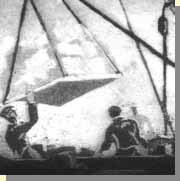
![[Previous]](prev.gif)
![[Next]](next.gif)

When Franklin Delano Roosevelt took office in 1933, he promptly set about to deliver on his presidential campaign promise of a "new deal" for everyone. In 1935 Roosevelt formed the Works Progress Administration ( later renamed the Work Projects Administration--WPA) to create jobs that would allow individuals to maintain their sense of self-esteem. Even though inequities existed under the New Deal programs, they included ethnic and marginal groups, the financially and politically disenfranchised, the geographically dispersed, and women and children. In particular, many blacks found new employment opportunities, and special programs focused on three centuries of cultural accomplishments of African-Americans, as well as European contributions to national development.
During its brief existence, the WPA generated numerous documents consisting of written histories, oral histories, guidebooks, fine prints, plays, posters, photographs, and architectural histories, many of them relating to African- American history. Many black participants whose talent was nurtured by the WPA continued to make significant contributions to American culture after they left the WPA. Many of these individuals are represented in the collections of the Library of Congress.
The WPA materials were acquired for the Library largely through the efforts of Archibald MacLeish while he was Librarian of Congress from 1939 to 1944. Included are thousands of measured drawings made for the Historic American Buildings Survey (HABS); hundreds of oral histories from former slaves; records of theatrical performances given by the Federal theater Project; thousands of Farm Security Administration (FSA) photographs of rural life; hundreds of prints and posters produced by WPA artists; and the archives of American folklife.
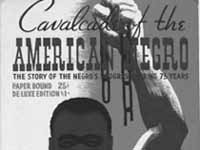
Exposition Celebrating Seventy-Five Years of Freedom for Blacks since the End of the Civil War |
This poster promotes the sale of a book about the Diamond Jubilee
Exposition held in Chicago, July 4 through September 2, 1940.
The Exposition, the first of its size and scope, celebrated
seventy-five years of freedom for blacks and their cultural
achievements during that period since the Civil War. Cavalcade of the American Negro Artist unknown Silk-screen poster Prints and Photographs Division (63) |
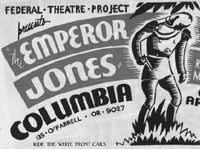
Poster Advertising the Federal Theatre Production of Eugene O'Neill's Play The Emperor Jones |
The Emperor Jones was one of several plays produced by the WPA's
Federal Theatre Project in which blacks and black themes were
featured. The play also was one among many controversial
productions of the FTP. On the bottom of the poster, patrons are
directed to the "white front cars" of the trolley when proceeding
to the theater. Federal Theatre Project presents "The Emperor Jones" with Ralph Chesse's Marionettes Artist unknown Silk-screen poster Prints and Photographs Division (64) |

Poster Advertising One of the Many Black Musicians' Concerts Sponsored by the WPA's Federal Music Project |
Although offered during a less enlightened era in America when
"separate but equal" was still the rule, this concert by black
musicians, directed by Norman L. Black, reflects the widespread
interest in black innovations in rhythm and blues. Colored Band Concert Carken, Chicago, Illinois Silk-screen poster Prints and Photographs Division (66) |

Poster Welcoming Readers to Use the New York Public Library's Schomburg Center for Black History and Culture |
With the entrance of the United States into World War II in 1942,
the graphics units of the Fine Arts Project of the WPA was
absorbed by the Defense Department's War Services Division. That
Division produced hundreds of posters in support of the war
effort, including this one encouraging reading about black
contributions to the defense effort, among other subjects, in the
Schomburg Center. The Schomburg Center was established within
the New York Public Library system by Arthur A. Schomburg, a
Puerto Rican of African descent, and it includes material by and
about blacks throughout the world. Books are Weapons. Read About...The Negro in National Defense; Africa and the War; Negro History and Culture J.P. (signed) New York, NY Silk-screen poster Prints and Photographs Division (67) |
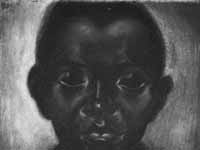
Portrait of a Young Black Man |
This portrait of a young black man was done by the African-
American artist Dox Thrash, who supervised the WPA Federal Art
Project's graphics division in Philadelphia. Like many artists
of the Art Project, Thrash made numerous studies of ethnic
"types" and of interesting places within their locale -- in
Thrash's case, Philadelphia. Bronze Boy Dox Thrash (b. 1892) Aquatint Prints and Photographs Division (68) |
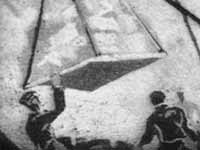
Philadelphia's Pier 27 in the 1930s |
Thrash's view of the Pier in Philadelphia during the 1930s is
typical of hundreds of similar -- now priceless -- glimpses of
local spots of interest produced by artists of the WPA's Federal
Art Project. Many of these artistic creations were done by
destitute artists whose support by the WPA was crucial to the
continuance of their careers -- especially African-American
artists. Pier 27 Dox Thrash (b. 1892) Aquatint Prints and Photographs Division (69) |
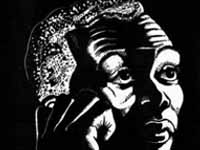
Portrait of a Pensive, Aging Black Man |
This brooding portrait of a black man is inscribed: "To Mr.
Macleish (sic) From William E. Smith." Nothing is known about
the artist, but Macleish was the Librarian of Congress, as well
as a famous poet and champion of democracy, at the time Smith
presented the print to him. "No Body Knows" William E. Smith Linocut, 7/50 Prints and Photographs Division (70) |
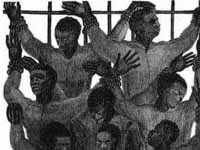
The "Scottsboro Case" Defendants, Indicted for Rape and Sentenced to Death, March 31, 1931 |
The Scottsboro Case involved nine black youths who, on March 31,
1931, were indicted in Scottsboro, Alabama, for raping two white
girls. Eight of them were sentenced to death, but after years of
appeals and retrials, spearheaded by the Scottsboro Defense
Committee, some were released, some remained in prison for years,
and one escaped. The case was one of the most sensational of the
time, and, as might be expected in the political hotbed of the
thirties, became a centerpiece for charges and countercharges of
radical communist involvement. 8 Black Boys in a Southern Jail Prentiss Taylor Lithograph, 40 prints Prints and Photographs Division (71) |

Portrait of a Young Black Man |
This engaging portrait of a young man is another of the many
representations of ethnic and racial "types" that were done by
artists of the WPA's Federal Art Project. Not only are the
subjects mostly anonymous, but the artists as well, despite the
fact that their names are often known. Much research needs to be
done to identify these artists, black and white, and to relate
their WPA experience to their subsequent careers. Reggie Raymond Steth Carborundum Print, No. 25, 1940 Prints and Photographs Division (73) |
Next section of the African-American Mosaic
Table of contents for the African-American Mosaic
 Library of Congress
Library of Congress